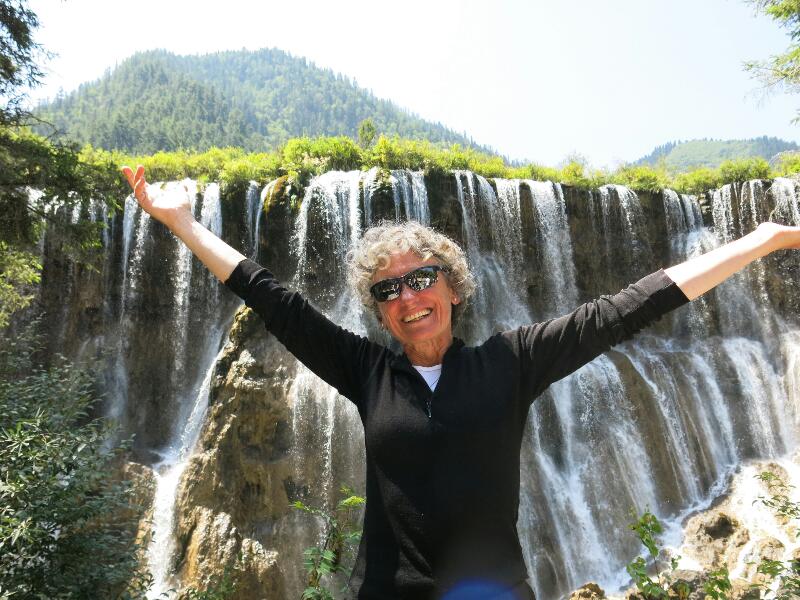
During my 11 days in Osh I hardly moved from the hostel. I was so exhausted that, at the beginning, I seriously wondered whether it was time to go back home. However, as days went by and I felt more rested, the urge to get back on the road returned and on the 8th of July, exactly a year after I had left London I was on my way to the Chinese border.
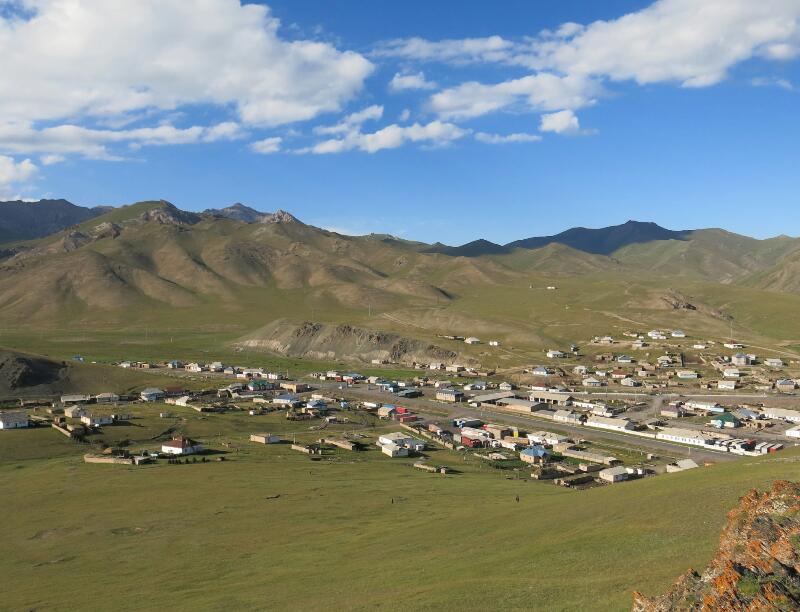
One year!!! How fast it seems to have gone. During that time I have experienced the pass of the seasons. I have seen the crops ripen on the fields, be harvested, be sown. I have felt the rain, the wind, the sun and the snow in my skin. I have seen huge rivers, high mountains, and big deserts. I have heard lots of different languages and seen the features in people’s faces change. I have tasted lots of different foods and I have enjoyed the generosity of many people from many countries…These experiences are changing me – my body has changed, I don’t know whether the lines in my face have increased with the exposure to the elements, whether my skin has sagged but I know I’m the fittest I’ve ever been; I know that emotionally I feel more calm and at peace with myself. Of course I miss my loved ones, fiercely sometimes, but I wouldn’t want to be anybody else or be anywhere else. I feel the richest woman on earth and immensely grateful for the chance I have to explore this beautiful planet.
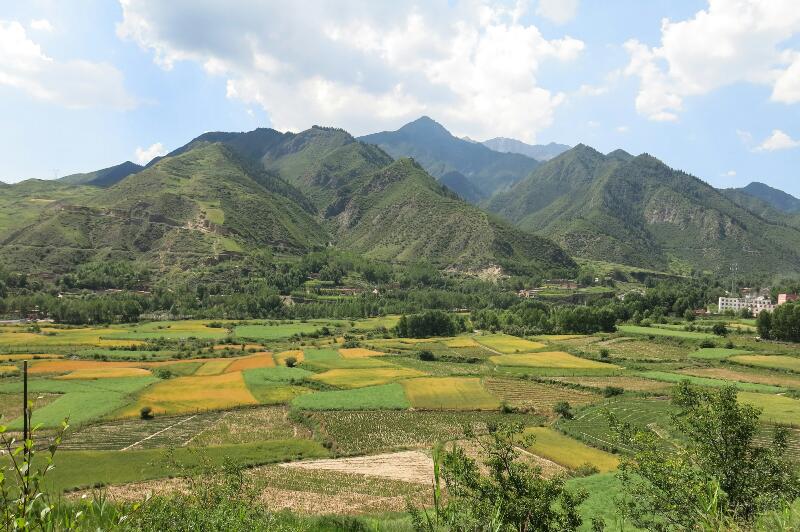
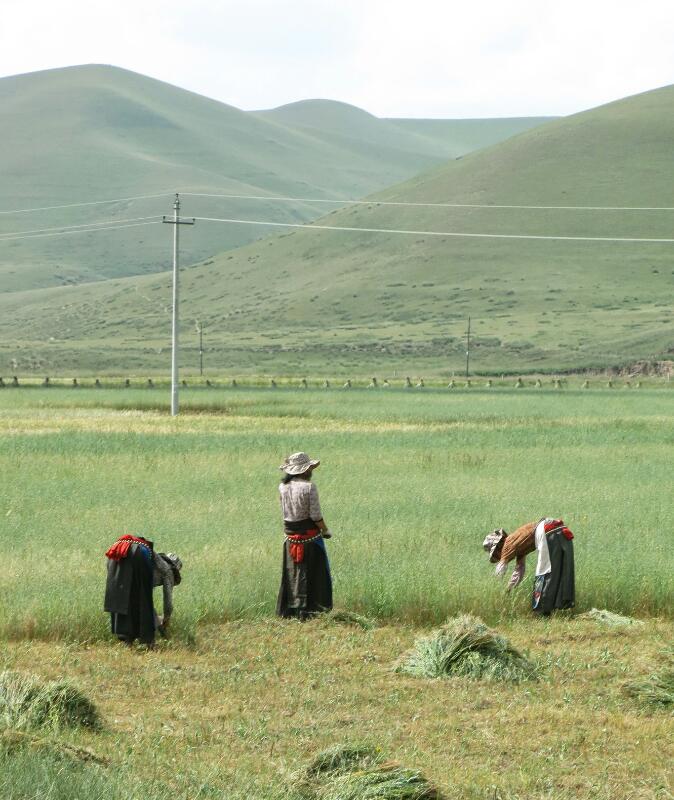
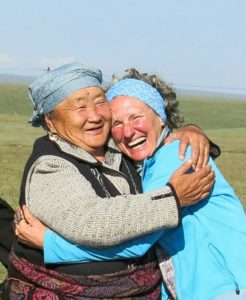
I cycled the remaining 70 Kyrgyz km that separated me from the Chinese border in brilliant sunshine, amongst beautiful mountains dotted with nomads’ yurts and slept my last two nights in Kyrgyzstan in those yurts.
Crossing the border took the best part of a day. On the Kyrgyz side, heavily armed militarily personal checked my passport several times and on the Chinese side I had to cross three checkpoints. In the first one they checked the visa. After a three km ride on a road as smooth as silk with barbed wire on one side and the river on the other I arrived at the second checkpoint where all the panniers were x-rayed and their content examined by a zealous young official and I was packed into a taxi that would take me to the third and final checkpoint 150 km away where finally I got the stamp in my passport – I’d made it to China!
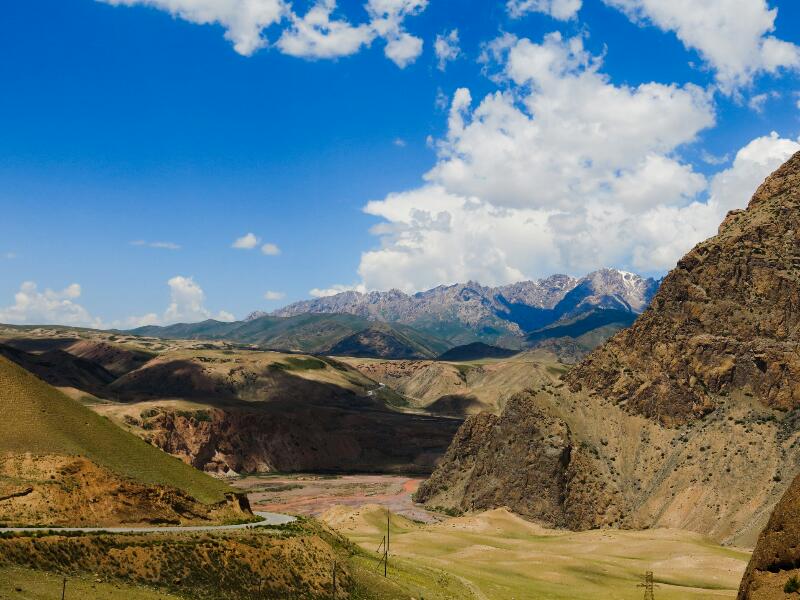
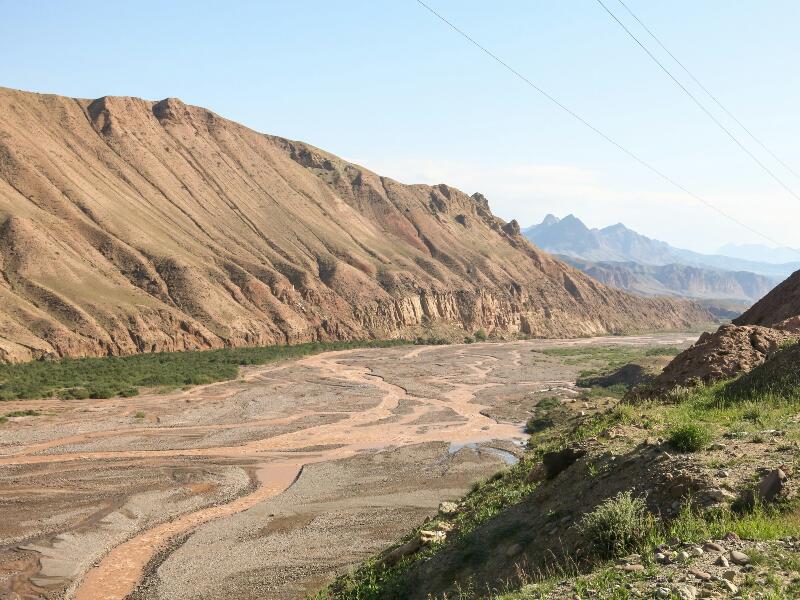
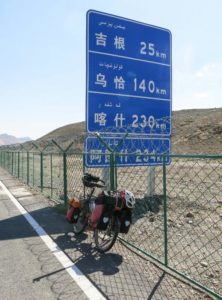
I was with Dietrich, a Swiss cyclist I met in Sary Tash and together we cycled down a broad empty avenue into what felt like a ghost city – huge buildings, huge roads and not a soul in site. After being refused in a hotel we found one that accepted foreigners and settled in. After such a long time in the mountains it felt strange and exciting being in a town. At the supermarket, I felt like a child in a toy shop!
Kashgar greeted us the next evening after a long ride through the desert. Kashgar, such evocative place, an important stop on the ancient Silk Road, its history stretches over 2,000 years. It’s a real shame that not much of its old town remains having been bulldozed down to the ground to make way to the big modern city. What remains though is magical and I enjoyed getting lost in its narrow streets, wondering in the huge Sunday bazaar and eating in its night market.
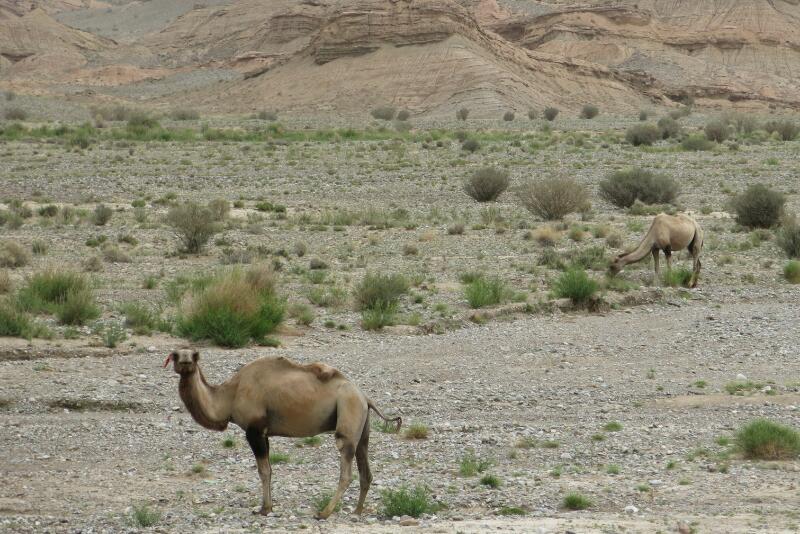
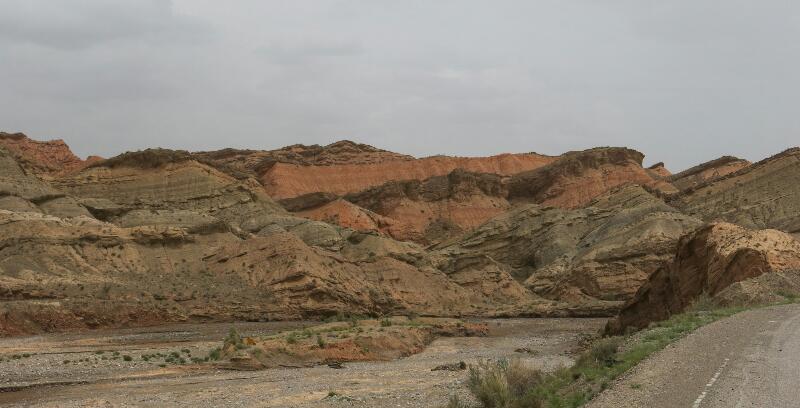
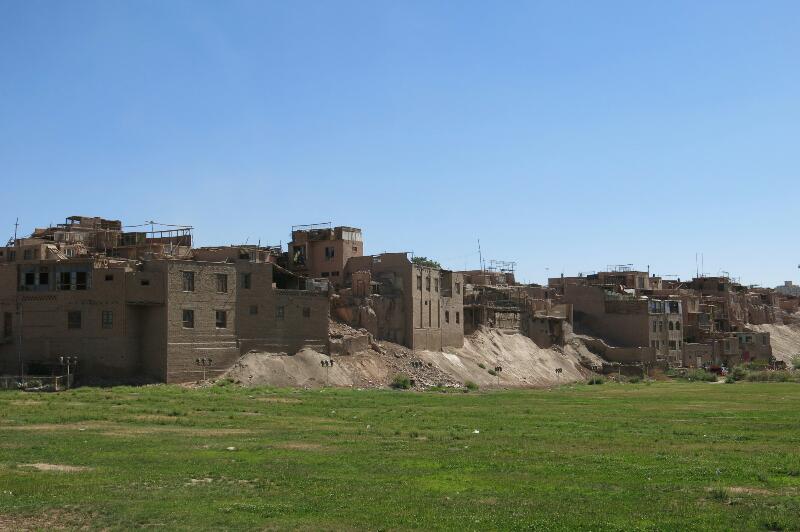
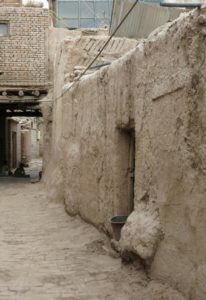
I couldn’t leave Kashgar without visiting the Sunday animal market. When the crowded local bus that was taking us there started overtaking dozens of small vehicles with sheep, I knew we were getting near the market.
The market was amazing. Noise, dust, people trading. At the entrance of the market the food stalls were teeming with customers having soup served from huge cauldrons of boiling liquid. Groups of sheep were tied to wooden posts nearby waiting to be slaughtered, no hiding what you are eating in here!
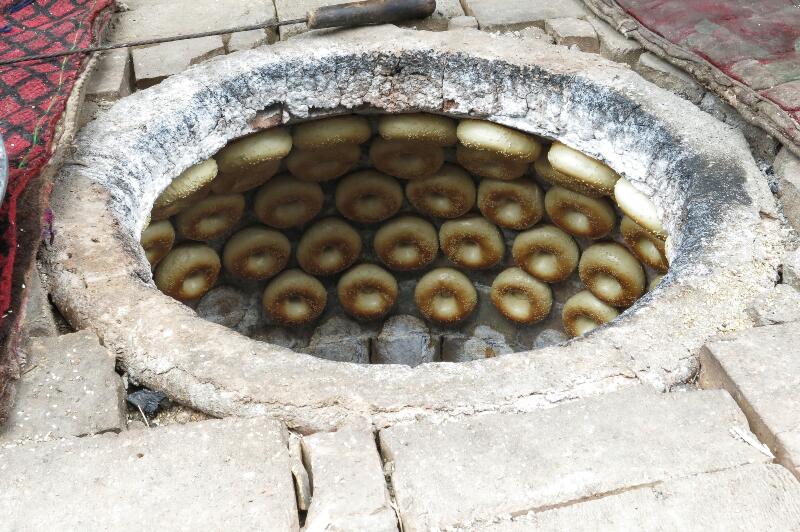
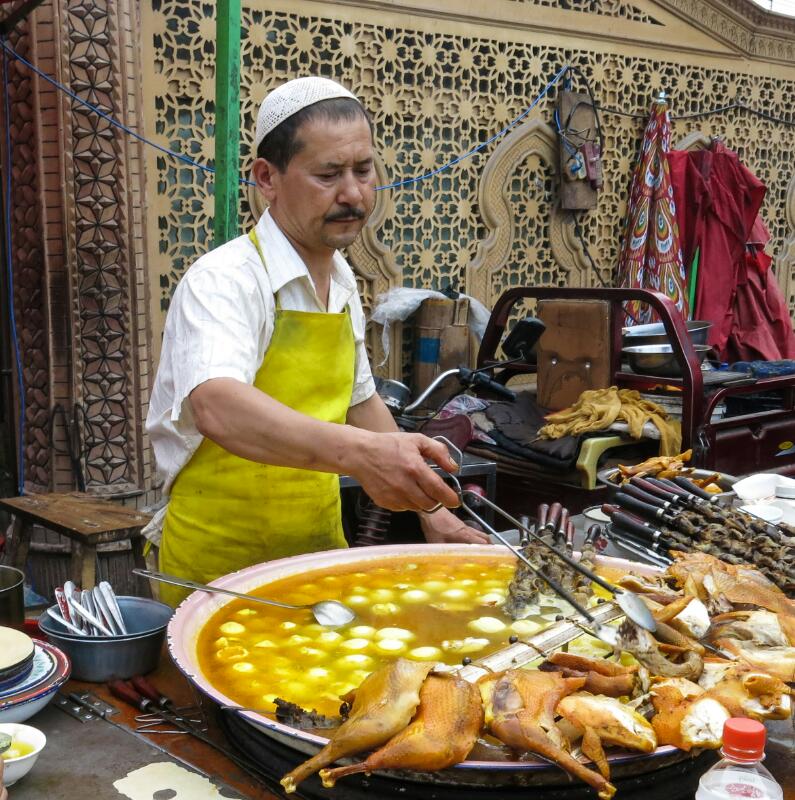
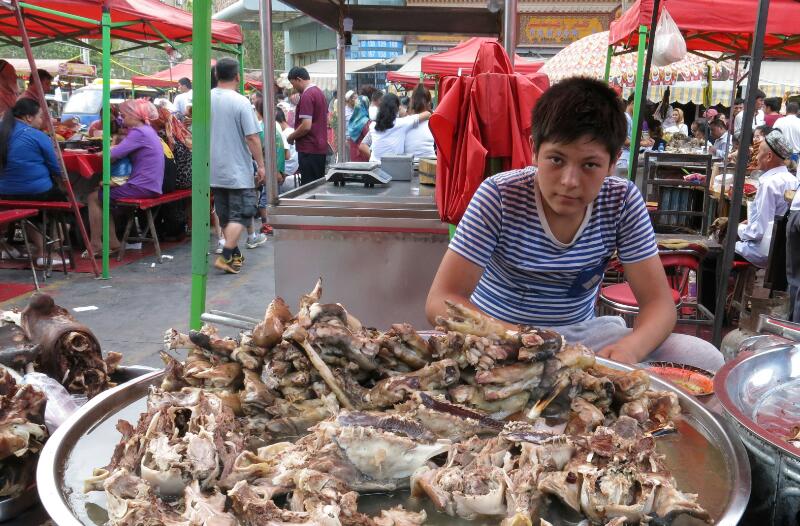
Rows and rows of animals were in display waiting to be sold, people were trading noisily, the buyers looking inside the animals’ mouths, the sellers carefully trimming the wool in the bottom of the sheep to display their fat deposits. A truly fascinating place.
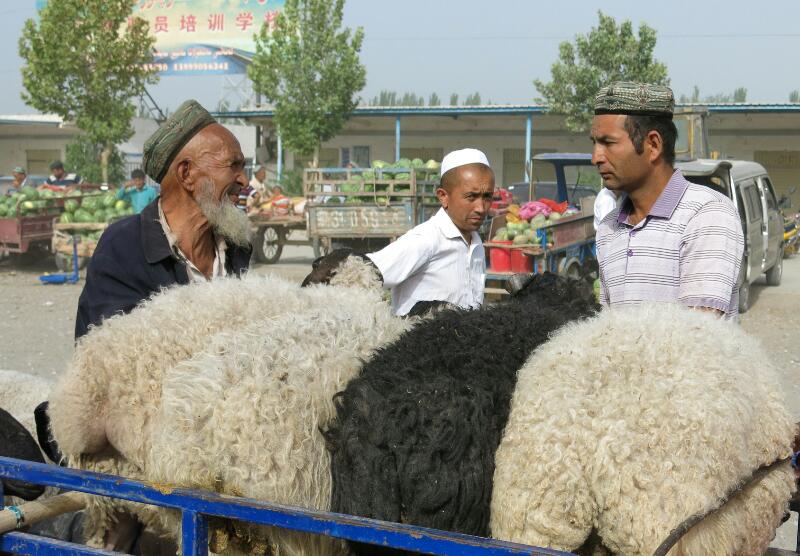
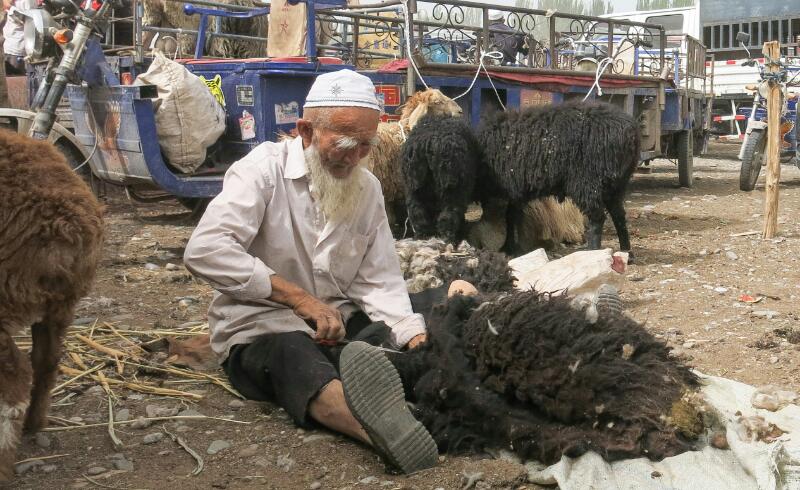
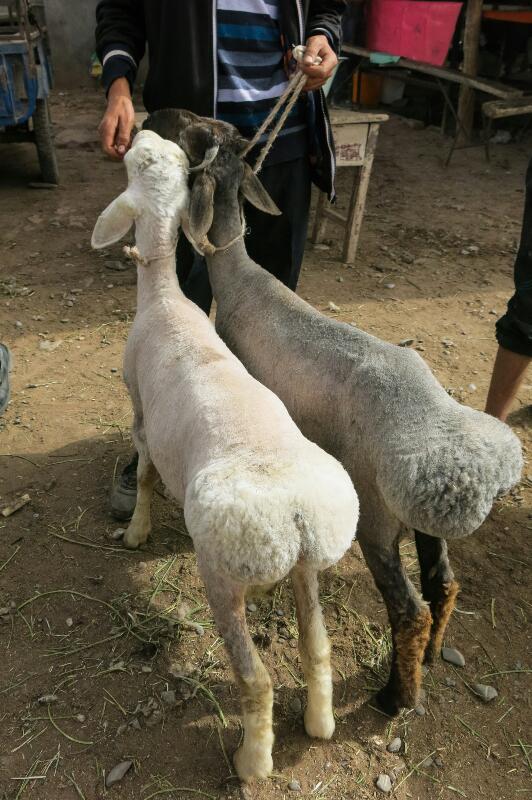
Urumqi was my next stop. A night bus took Foxtrot and me there and from there I took a train to Xining from where I started cycling to Chengdu. Sending the bike as cargo was really easy but I felt quite anxious being separated from it. Buying my ticket was another matter, I queued for over one hour at the only counter with an English speaking member of staff. I was amazed at the patience displayed by everyone in the queue, specially as these people had had to show their ID several times to police and military personal. Urumqi has a very visible police presence ready to crush any Uyghur insurgency, armored vehicles and armed military are everywhere. It reminded me of the streets of the Basque country when I was young.
I said goodbye to Dietrich and got into the bullet train that would take me to Xining were I got reunited with Foxtrot and started in earnest exploring China on a Bike.
First I went to Qinghai Lake, the largest in China, located over 3000 meters high in the Tibetan Plateau. The lake and the sand dunes around it were beautiful but I found the Tibetan Disneyland with its flags, archery, camels, horses, quads, karaoke noisy and invasive. Anything is a business opportunity here, even the rapeseed flower fields have an entry fee and they are full of people having their picture taken amongst the flowers.
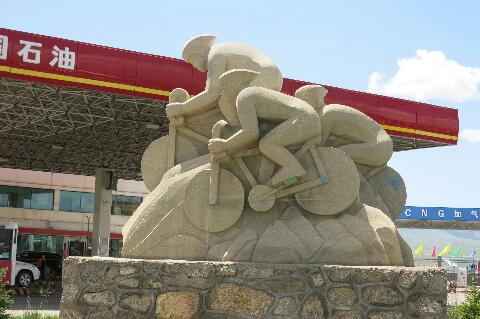
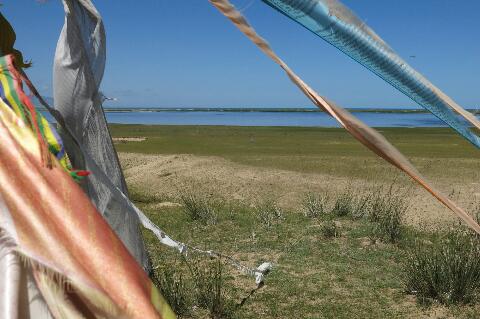
From the lake I continued climbing, crossing high passes of nearly 4000 mt covered in prayer flags. This is so different from the Pamir, so much more welcoming – grasslands and nomads with their herds of sheep and yaks everywhere.
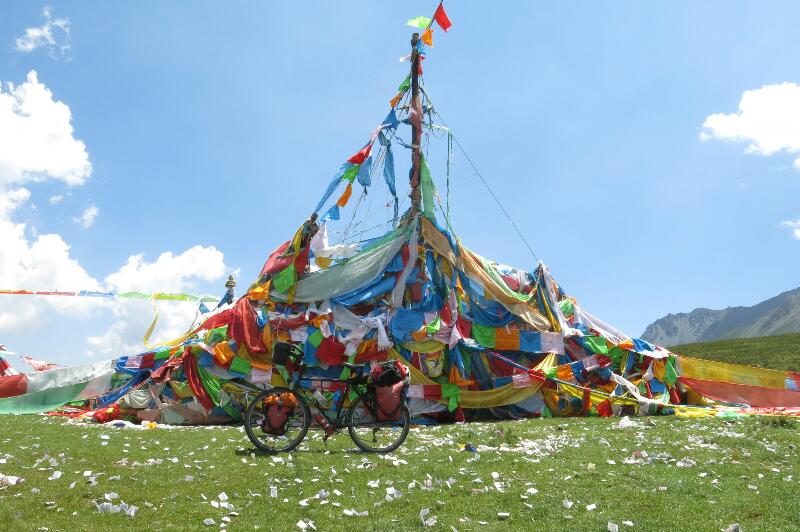
One day I camped next to some nomads’ tents I woke up to the sound of sheep insistently rubbing against my tent. They just wouldn’t go away and smiling I wondered whether they thought the tent was a big mound of grass to munch on! It was very peaceful outside, the sun was coming from behind the mountains, yaks all around, small little mice with big ears were everywhere coming out of their underground tunnels and small birds were hopping around. With a hot mug of coffee and snuggled up in my warm sleeping bag I felt totally contented.
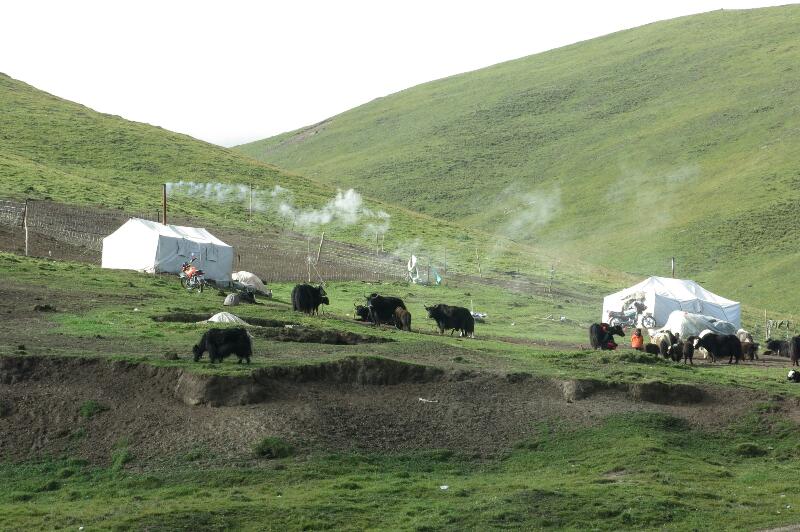
Miles away, physically and emotionally from my London home I thought about how different my life there was from that of the family of nomads next door and how much unnecessary stuff I’ve accumulated throughout the years. Their tent was so simple, a solid fuel stove took center stage in the tent, it’s flue sticking out through a hole in the ceiling. There were no floor coverings on the well trodden wet earth. The furniture was sparce, a double bed and a single bed standing in brissblocks, two small cupboards, one of them with what looked like a battery to power the single bulb hanging from the ceiling and a a sort of TV.
The night before I had sat in the small bed whilst the father of the family dozed on the big one. Unable to speak the language, I sat and watched the woman lighting the cooker with yak dung cakes, using a piece of rubber as the ignition. The cooker resisted being lit and she only succeeded after several attempts. Then she busied herself tidying the tent. The china went in one cupboard, but only some of it, the other remained in a plastic bucket with a lid. Vegetables were piled in one corner whilst in the opposite corner the bags of yak dung cakes sat; all the while the little mice were running around undisturbed. By now the tent was full of smoke from the failed attempts to light the fire. After a while I left for my tent and as I was going to sleep I could hear them chatting and I found the sound of their voices really comforting.
The Tibetan Plateau is always at its best bathed in the early morning light, its golden, misty quality making making everything look just beautiful. In the Amdo region, one of the three traditional regions of Tibet, I rode through grasslands and high passes crowned with hundreds of prayer flags, some of then had big burners smouldering with the embers of juniper branches and in all of them I found little pieces of paper thrown out of the windows of cars as offerings.
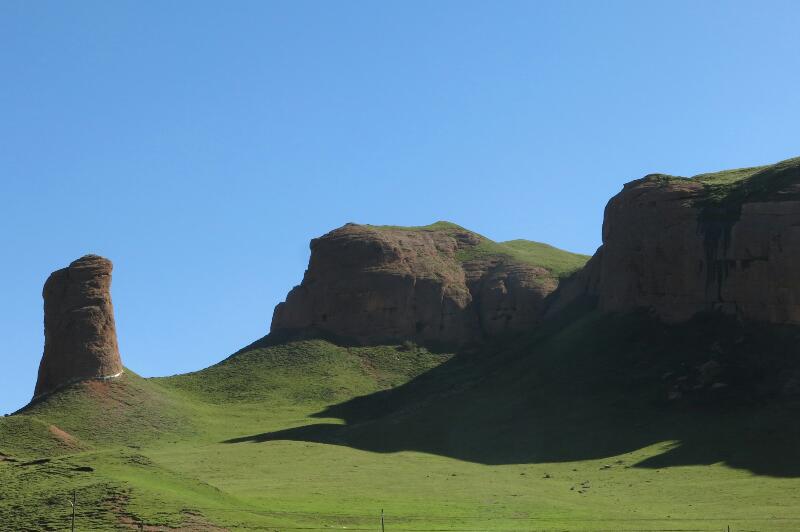
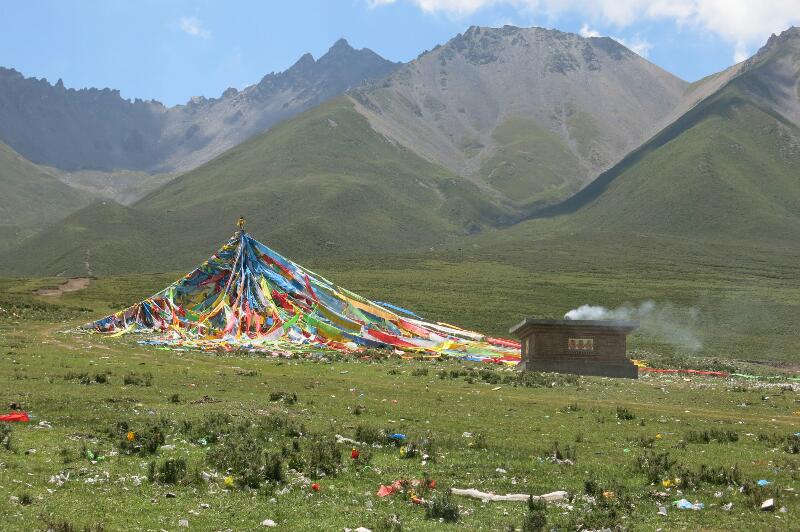
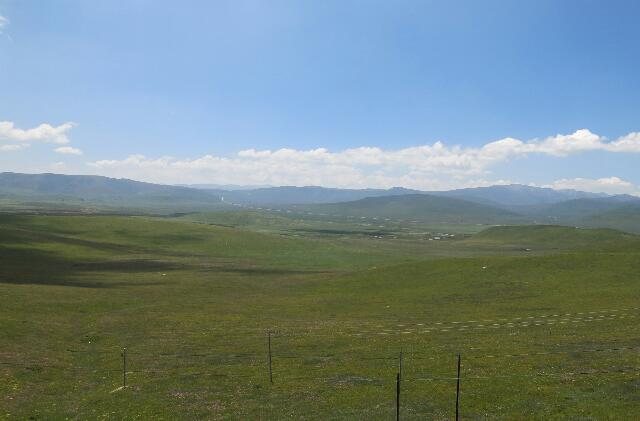
Motorbikes have replaced horses here and whole Tibetan families, in their traditional costumes, go from A to B on them. The sound of motorbikes can be heard everywhere, shepherds use them to guide their herds of yaks, people carry harvested crops, water, babies… they are everywhere.
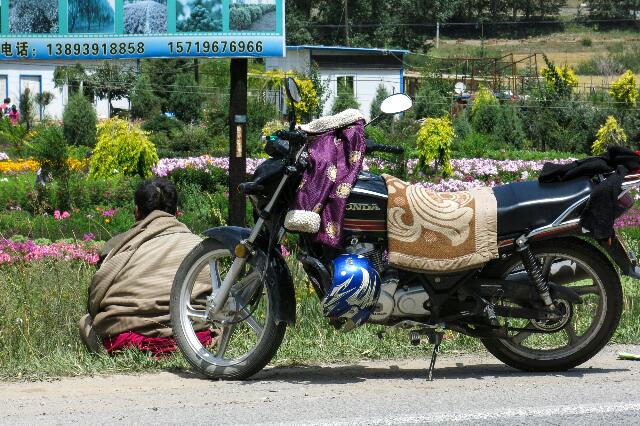
I went through towns and villages and I encountered the Yellow river, the third longest in Asia and the sixth in the world, still close to its origin and small but impressive.
My wheels were taking me to some of the holiest monasteries of Tibetan Buddhism. The path to the monasteries could not have been more beautiful, emerald green grasslands packed with flowers, honey sellers in their tents by the side of the road, yaks happily munching, women milking yaks, children playing…
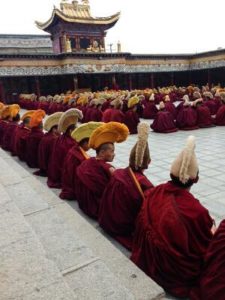
Longwu Monastery in Rebkong is one of the major monasteries of the Gelugpa (Yellow Hat) Tibetan Buddhism, the sect of the Dalai Lama. It was founded in 1301, destroyed during the Cultural Revolution and now has been rebuilt and is home to hundreds of monks that engage in lively philosophical debates. I loved witnessing one of the debates with the sound of thunder from a brewing storm in the background.
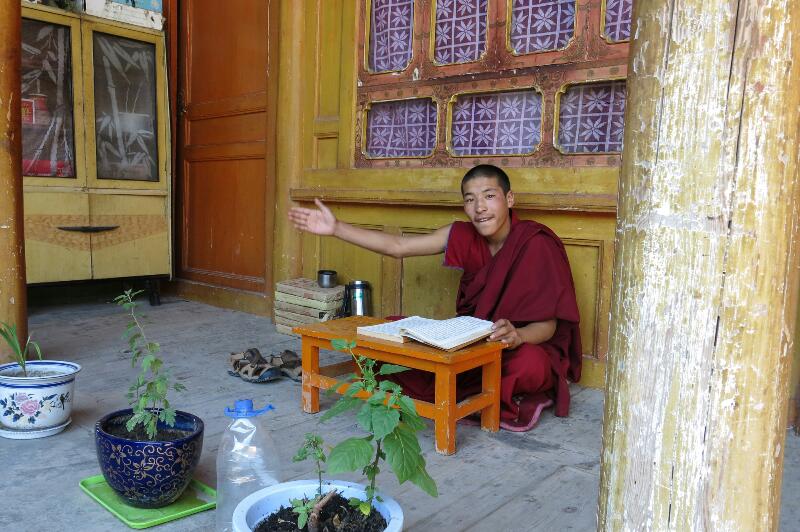
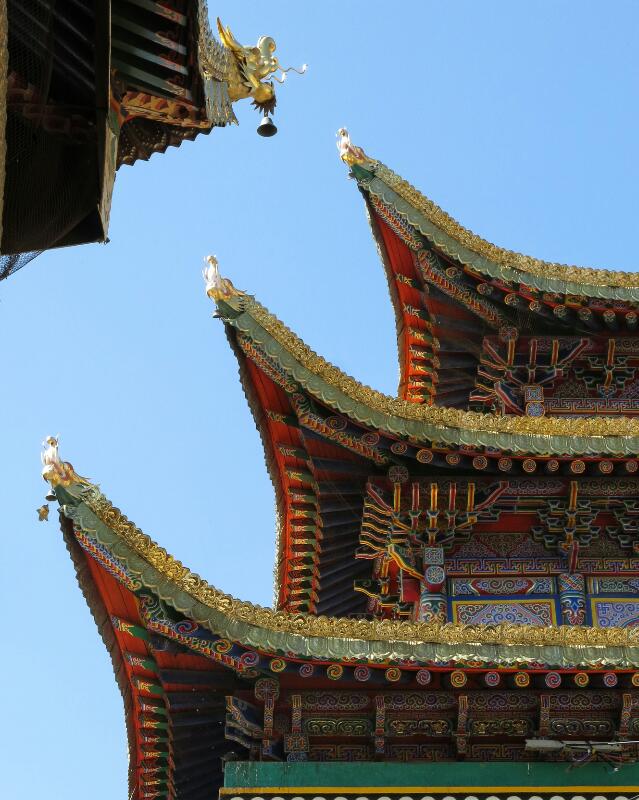
Labrang Monastery in Xiahe home to the largest number of monks outside of the Tibet Autonomous Region, it is Tibetan Buddhism’s most important monastery outside the Autonomous Region. The place was packed with Chinese tourists but at 5am when I went to listen to the early morning prayers of the monks I had it for myself.
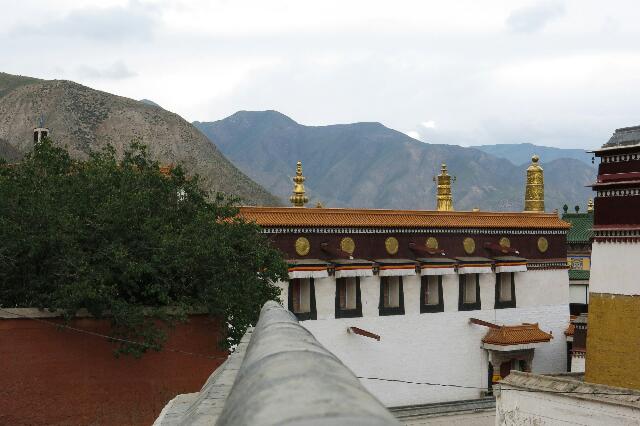
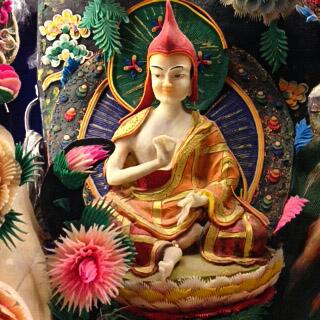
Langmusi was my final monastery stop in Amdo. It was in Langmusi where I became aware that something had shifted within me since I finished the Pamir Highway. In my mind, I had made it into such huge milestone in my trip that, right from the beginning, it was forever present. It was like if a part of me was constantly worrying about whether I would be able to cycle it, to meet the self imposed deadline of May/June and now that I had done it, I could relax and slow down. Suddenly I was no longer in a rush to get anywhere. So when the opportunity to stay an extra day in Langmusi and visit some local hot springs came up I grabbed it.
I arrived at the hot springs with Kfir, Eithan (two travellers I had met first in Xiahe) and Joanna a Polish woman travelling with her three young children. The building that housed the women’s pool was a big concrete square with columns inside.
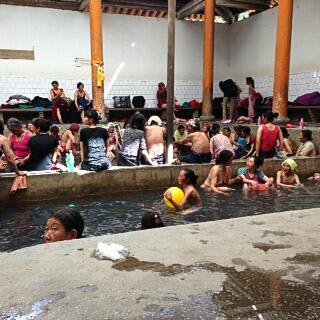
As I entered the pool room I was hit by a sulphurous smell coming from a big pipe filling the pool. About 60 women of all ages sat inside the water on the slimy and slippery wooden boards that made the bottom of the pool. Many of the women sat bare breasted, their turquoises and amber necklaces hanging from their necks as a sign of their wealth and status. Women were massaging one another, rivulets of dirt and dead skin falling in the water, others were drinking that same water with cut out plastic bottles, whilst at the same time, others were nursing their babies, chatting or helping the old and frail to get into the pool and yet others were praying. Children, like children anywhere in the world, splashed in the water and shrieked with delight the sound of their voices echoing in the space.
There were no changing rooms, just a concrete bench around the pool room where piles of Tibetan outfits and some wonderfully colourful trousers with matching tailored jackets and turban like head dresses sat in disarray. The water was too hot for me so after a little while, I came out to sat in the bench amongst the clothes and enjoyed watching the women and children.
My next stop was Song Pan. I had been there before with eldest daughter Emma in 2007 and I was expecting to find the quiet small village from where we went horse trekking. Nothing further from the truth – restaurants, yak meat sellers, neon signs, shops, hundreds of Chinese tourists. The sleepy little town had gone forever. It was, however, the perfect place from where to explore the spectacular Jiuzhai Valley located right on the edge of the Tibetan Plateau. The park receives over 36,000 visitors a day in high season and I was dreading being amongst so many people. I was lucky, Chinese tourists don’t like walking very much so I had big expanses of the park to myself and quietly enjoy its beauty.
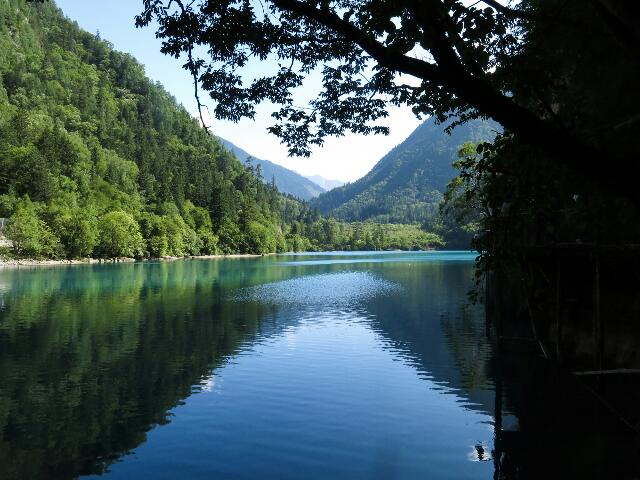
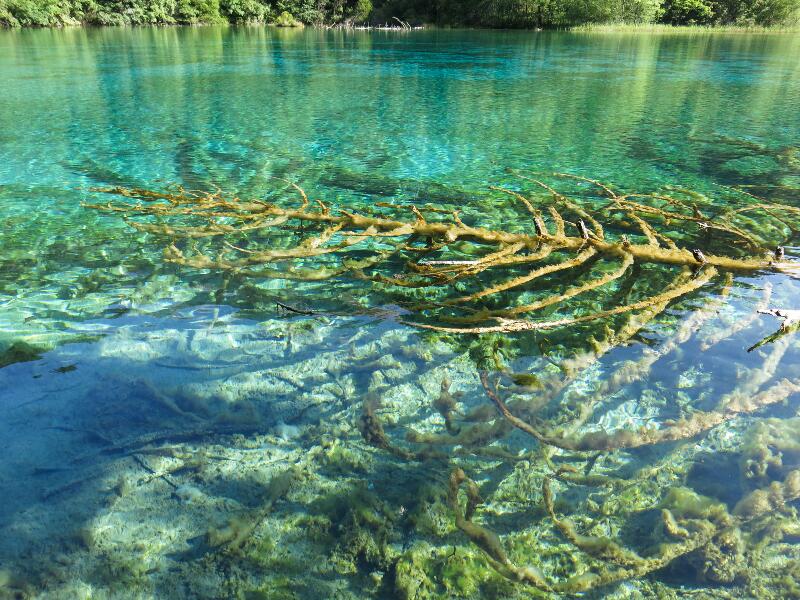
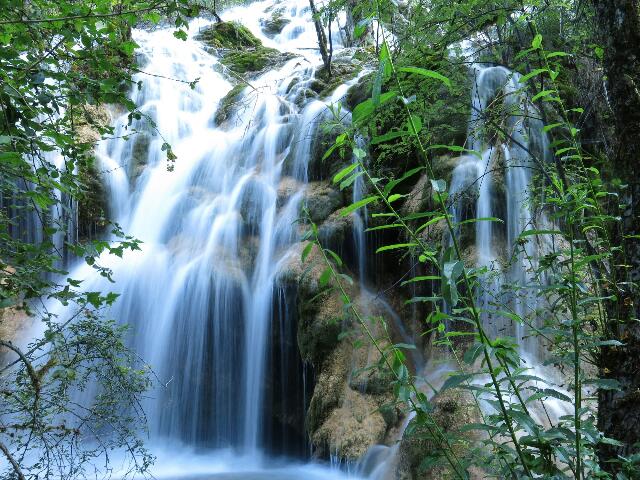
Not having had enough with Jiuzhai, the following day I went to Huanglong Park, smaller, more intimate and less crowed, I found its travertine landscape exquisite.
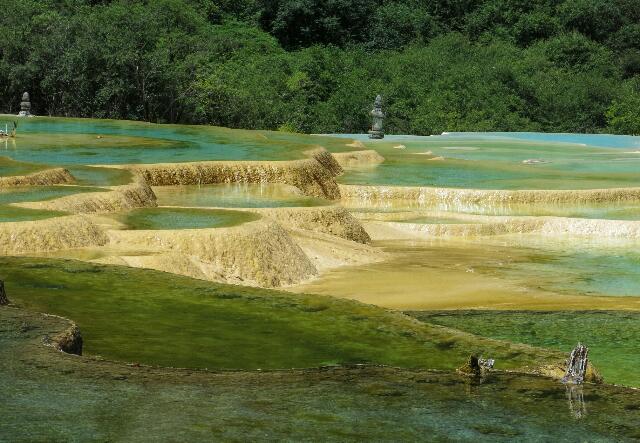
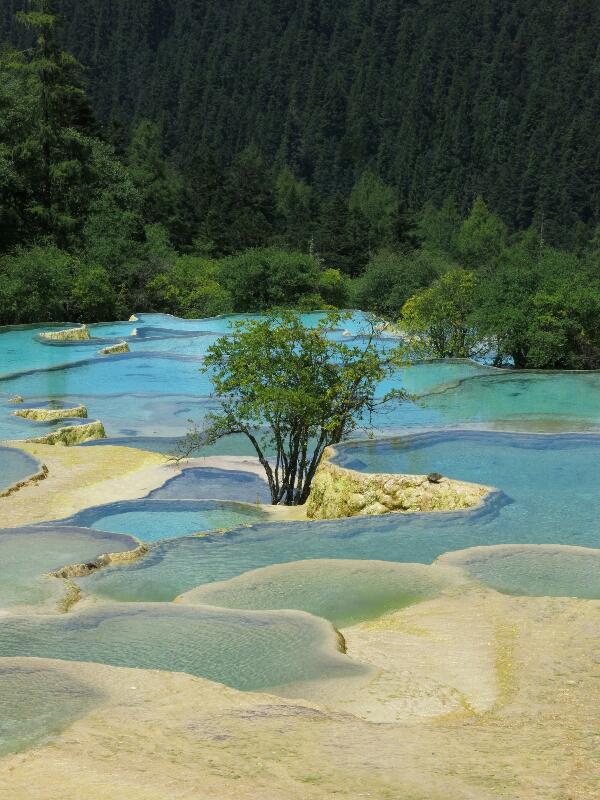
The parks were my farewell to the Tibetan Plateau, they were like the grand finale of and spectacular firework display.
Back in Song Pan I started the long descent into Chengdu and Han China.
Fascinating, so jealous. So glad you are enjoying, stay safe
Hi Blanca,
Great to get another post. Glad you got a few days rest and are enthusiastic again for more adventue. Keep the good tales coming!
Great post Blanca. I Google the place names to see where you are. Fascinating tales. That for sharing. Take care…as you always do I’m sure. Xxxx
Your blog and pictures are brilliant . What an amazing year you’ve had – keep safe X
Wow – wonderful photo – how far you have traveled. It must be so interesting to see the differences between the different laces and also the similarities.I really enjoy seeing and hearing about your adventures.
Dearest Blanca, you sound so happy. You have come a long way in yourself as a person and I can feel that through your words. Your journey is that of which dreams are made it is as if your trusty bicycle has evolved into a magic carpet of beautiful colours. I wish you well and look forward to even more pictures and stories as you travel around our magnificent planet. Stay safe our prayers are with you always.
Huge congratulations and what an amazing year, my lovely friend. I love how you describe all these very different and extraordinary events, the extremes of climate and landscape, people, sights, smells, food, and take it all in your stride. What a woman! A huge hug for you for the year to come.
Blanca, I hate getting to the end of your blogs. We have all been reading a slow travel book for a year. Nothing like the anticipation of when the next chapter will pop up. It makes me slow down just reading it. The photos are spectacular. The Tibetan plateau is stunning! I love seeing pictures of things you wouldn’t normally see and things that you found interesting. You made it to China. That is really big. Shame you can’t think its physically down hill here now. I imagine you have quite a few more mountains ahead of you. what is the reaction of he Chinese to you? Stay safe and stay happy… lots of love Luce xx
PS i have just learnt what a travertine is. They are beautiful!
Can’t wait to feel those thighs when you get back! I love reading these!
Thanks Blanca. Another magical post. I love getting these glimpses of other lives and other countries. The military, and then the carefully sculpted sheep rears, and the large- eared mice! The photos and the stories work so well together, not as staged as a documentary, more personal than an article. Good to hear you had a proper rest as well!
I look forward to your next post.
All the best
Sarah
I first read this blog whilst snuggled in my tent with a heavy storm passing noisily overhead. Your words and pictures brought such warmth.
Back at home and on my laptop I can see the images so much clearer and read the words with a new and added interest. Even though I knew exactly where you were – reading your account of your journey is so very special, remarkable. Your journey has been amazing, awe inspiring and makes me go goose-bumpy.
Wonderful post and wonderful photos, Bianca. Congratulations on a great year!! Can’t wait to hear your talk at the Cycle Touring Festival one day….
Wow Blanca, what an incredible physical and emotional journey. You are so brave and must feel so free. Your writing is very evocative and the photos are wonderful. Thanks in particular for the pictures of the roofs. Now I’m really jealous!
Loads of love, Kath xxx
¡Genial!, me quedo siempre sin palabras.
Todo nuestro cariño y apoyo.
Besos guapisima.
Hi Blanca,
Thanks for taking the time to write your blog and post your photos. We really enjoy reading it. Ciao our friend.